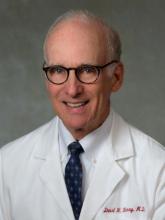Howard “Skip” Burris, MD, the chief medical officer of Sarah Cannon Cancer Institute in Nashville, Tenn., joins the podcast as the guest host for a discussion of PD1 and PDL1 in the treatment of lung cancer. Dr. Burris interviews Melissa Johnson, MD, the associate director of lung cancer research at Sarah Cannon. Plus, in Clinical Correlation, Ilana Yurkiewicz, MD, of Stanford (Calif.) University dives into the financial realities of cancer care.
Show notes
By Emily Bryer, DO, resident in the department of internal medicine, University of Pennsylvania, Philadelphia
- Programmed death ligand (PDL1) is a protein that is expressed by the tumor to escape detection by the immune system.
- T-cells produce PD1; when PD1 binds to PDL1, cancer can remain undetected.
- By blocking the binding of PD1 to PDL1, the immune system is able to recognize a tumor as foreign.
- Tumors with a high mutational burden typically have the most robust response to PD1 and PDL1 therapy.
- Treatment of patients with lung cancer with high mutational burden or high PDL1 score greater than 50% could likely be treated with monotherapy PDL1.
- Treatment of patients with lung cancer with low mutational burden or low PDL1 score consists of chemotherapy plus immunotherapy.
- In the field of lung cancer, tumor mutation burden is lower because lung cancer is typically driven by a single oncogene (EGFR, ALK, etc.).
- About 20% of lung cancer patients have a long and durable toxicity-free durable course when treated with PD1 and PDL1 inhibitors.
- Immunotherapy takes longer than chemotherapy to manifest a positive or beneficial change in patients.
- Monotherapy with PD1 and PDL1 inhibitors can cause autoimmune toxicity which may be recurrent.
- Upfront testing of PD1 and PDL1 in patients in clinics could lead to the early identification of patients who may benefit from immunotherapy.
Additional reading:
ESMO biomarker fact sheet for immunotherapy.
J Immunother Cancer. 2018 Jan 23;6(1):8. doi: 10.1186/s40425-018-0316-z.
You can contact the show at podcasts@mdedge.com and you can interact with us on Twitter at @MDedgeHemOnc

